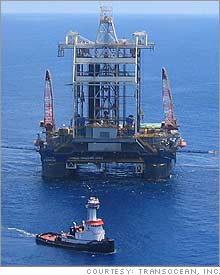Chevron sees big profits in AsiaCEO O'Reilly says the oil giant will take advantage of surging demand in China; predicts the enactment U.S. greenhouse gas laws.NEW YORK (CNNMoney.com) -- China's growing appetite for oil will be a challenge for U.S. consumers already facing rising gas prices, but an opportunity for Chevron, CEO David O'Reilly said Tuesday at an analyst conference in New York. In a wide-ranging speech, O'Reilly said that U.S. greenhouse gas regulations "undoubtedly" will arise, warned about the risk of nationalization and its impact on future investments in Venezuela, while he reassured investors that Chevron is not dependent on politically risky areas like Russia or the Middle East for growing its oil reserves.  O'Reilly said California-based Chevron (Charts), the country's second-largest oil company whose Asian operations include Australia, Thailand, and Indonesia, is well-positioned to take advantage of China's growing energy use. Claiming that Chevron has the largest presence in the region of any competitor, O'Reilly said "we are distinctly advantaged for this reason." "It is clear that the Asia Pacific region will be the dominant economic force 25 years from now," he said. When asked what this meant for U.S. consumers, he said "really, this is a global market," implying rising demand in one country affects prices worldwide. Like many major U.S. companies, O'Reilly expects new laws aimed at limiting emissions of carbon dioxide, the major greenhouse gas. "There is undoubtedly going to be some type of greenhouse gas controls in the U.S.," he said. He added that he doesn't expect any new legislation until 2010 at the earliest. O'Reilly also echoed other companies in saying Chevron would prefer federal oversight of greenhouse gas emissions over a patchwork of state laws. California and several Northeastern states have moved to limit carbon emissions in response to what they see as a lack of action from the federal government. But the prospect of carbon restrictions - which could come in either the form of a cap on emissions or an outright tax -didn't seem to bother O'Reilly. "It's premature to say what the impacts will be," he said. "But it will clearly favor oil, gas and nuclear over the coal business." He also said Chevron had no trouble operating in areas that already have carbon restrictions in place, like the European Union. On the prospect of increasing the company's oil reserves - a central question when investors evaluate the viability of an oil's firm's stock - O'Reilly said Chevron's extensive operations in the Gulf of Mexico and Australia mean it will not have to boost production significantly in politically unstable places like the Middle East or Russia. He said Chevron should be able to increase its production by over 1 million barrels of oil and gas per day by 2011 without having to rely more on troubled regions for that growth. An addition of over 1 million barrels per day would result in average annual production growth of at least 3 percent, he said. Several analysts have questioned the ability of Western oil companies to keep up with rising oil demand if they are locked out of the oil-rich Middle East or strong-armed into less favorable deals in places like Russia or Venezuela. O'Reilly said Chevron's continued involvement in Venezuela will depend on the outcome of current contract renegotiations. Chevron and ConocoPhillips (Charts) currently own 60 percent of a 190,000 barrel per day Venezuelan oil operation. The Venezuelan government - led by its left-leaning president Hugo Chavez -controls the remaining 40 percent of the project, but is moving to take a 51 percent stake. "How we're treated in that negotiation will very much impact our appetite going forward," O'Reilly said. Last week Reuters reported that Exxon Mobil, the world's largest publicly traded oil company, will hand over control of a multi-billion dollar project to the Venezuelan state by May 1. Chevron is the world's fourth-largest publicly traded oil company by revenue, behind Exxon Mobil (Charts), Royal Dutch Shell (Charts), and BP (Charts). Chevron made a net profit of $15 billion in 2006 on revenue of $195 billion. Several state owned oil companies, like Saudi Arabia's Aramco, dwarf the publicly traded firms. ________________ |
Sponsors
|

